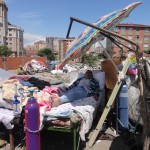Your cart is currently empty!
Category: Campaigns
-
Migrants’ money channels are a murky world

Migrants’ money channels are a murky world
Carol Goard
July 26, 2011
There is no paper trail. There is no oversight. There are no clear rules. But the cash flow is staggering: roughly $200 billion a year.
This amount, sent home by immigrants and migrant workers through back channels, dwarfs global foreign aid. Canada’s share — approximately $7.5 billion a year — is more than double the country’s official development assistance.
Although these hand-to-hand remittances do a tremendous amount of good in poor countries, they pose serious risks for both senders and governments.
Immigrants have no guarantee their earnings will actually reach their families. The money could be pocketed by greedy middlemen, stolen enroute or whittled down by bribes to corrupt local officials.
Financial authorities have no knowing whether this informal financial system is being used by drug dealers to launder dirty money or terrorist groups to finance international operations. It certainly has the potential to do both.
Yet few governments are taking steps to regulate this trouble-prone business. More surprisingly, they know almost nothing is known about it. All of the available statistics are ballpark estimates. All of the current knowledge is based on anecdotes and regional fragments.
A Toronto-based citizens’ group aims to spur reform. Acorn Canada, made of up low-to-moderate-income families, is conducting a multi-year campaign to make remittances safe and transparent.
It has taken the lead because its members — many of whom support families in Asia, Africa and Latin America — are tired of choosing between exorbitant bank fees and unreliable couriers.
Acorn has just released a report outlining the magnitude of “hawala,” as it is called, and the way it works.
A typical transaction unfolds something like this: An immigrant or seasonal worker wants to send money to his family back home. His English is rudimentary and he is intimidated by bureaucrats and paperwork and incomprehensible service charges.
So he checks an ethnic newspaper and finds an advertisement for cheap money transfers to his homeland. He visits the establishment, usually a small export-import business, and arranges to send a small amount — say $100 — to his family. The owner charges a commission ranging from 25 cents to $1.25 and gives him an identification number that can be used to pick up the money.
The merchant then contacts one of his suppliers or agents in the immigrant’s home country and arranges to get the money to its destination. The two traders settle their debt by manipulating their balance sheets.
When the system works, it provides a cheap, efficient way to send money overseas. When it breaks down, the immigrant is out-of-pocket and powerless.
There are safer ways to transfer funds, but they are extremely expensive. Acorn tracked the cost of sending a $100 remittance to Mexico, using recognized financial institutions, last fall. It found the cost could run as high as $50.
The cheapest option was MoneyGram, which charged between $3 and $10, depending on the speed and the level of service. The highest-priced was HSBC (Hong Kong and Shanghai Banking Corporation), which charged $50.84. The only Canadian bank willing to divulge its fees, Toronto Dominion, fell in the middle at $35.91.
“These rates are predatory,” says Kay Bisnath president of Acorn. They drive people to use they underground system. They induce risky behaviour.
This week, a delegation from the grass-roots group will attempt to convince deputy finance minister Michael Horgan that it would be in Canada’s interests to cap remittance rates and require banks to disclose their fees. Ottawa needs a window on this multi-billion cash flow and immigrants need a safe, affordable way to send money home.
It is unlikely that “hawala” will ever be eliminated. But in a 21st-century financial system that can move money securely around the globe with the push of computer button, immigrants deserve a better alternative.
Carol Goar writes for Record news services.
-
Op-Ed: Canadian Government Allowing Migrant Worker Ripoffs on Remittances
By Kay Bisnath, ACORN International, and Pascal Apuwa, ACORN Canada
The Canadian government can no longer afford to be apathetic towards the plight of migrant workers’ remittances when they are behind a guest-worker program that accepts candidates based on low levels of education and strong family ties. With such criteria it is unimaginable that the government would be unaware of the role of remittances in the lives of these workers’ families.
Every year, 20,000 workers from Mexico and the Caribbean, mostly men, make the journey to work in Canada’s agricultural sector, largely in southern Ontario and British Columbia. These migrant workers are brought to Canada through the government sponsored Seasonal Agricultural Worker Program (SAWP) for up to eight months. The program describes its function as matching “workers from Mexico and the Caribbean countries with Canadian farmers who need temporary support during planting and harvesting seasons, when qualified Canadians or permanent residents are not available.”
This is no sea cruise. Workers in the SAWP are poorly treated. They are required to work overtime without extra pay and a significant portion of their wages (about 25%) goes towards Canadian taxes and government programs as a donation to the Canadian government since they will never reap any benefits.
The SAWP exploits workers’ desperation to earn Canadian wages. Workers’ strong family ties and socioeconomic statuses emphasize the widespread need for affordable money transferring services. When asked, SAWP representatives admitted to having little knowledge of which money-transferring services program participants utilized or the fees they faced. SAWP workers are left to find ways to remit money without any assistance from the governments that has brought them here.
Using easily accessible Western Union, fees to transfer funds increase dramatically as the transferred sum decreases, often making the service unaffordable. Migrant workers usually send half their paychecks home (about 200-300 dollars). To send these sums with Western Union, fees can range from 7.5% to 12%. This doesn’t include the hidden exchange rate fee that comes out of the amount transferred. This changes daily with the exchange rate fluctuation and has been estimated by ACORN Canada at 4 – 6 %. Migrant workers in Canada have also been known to use Vigo Remittance Corporation to send their money home. While Vigo’s fees are lower than Western Union’s, the fees range from 6 % to 7% (for sums of 200 to 300 dollars), they are still sit above ACORN’s and the G-8’s, where Canada is also a primary participant, goal of a flat 5% rate and are still unaffordable for many migrant workers. For the low-wage migrant worker, such rates only further perpetuate their plight.
ACORN International and its federated partners ACORN Canada and ACORN Mexico have made continual demands of the Finance Ministry and provincial governments in both countries to regulate Money Transfer Organizations (MTOs) and cap fees, with only limited success and a limp promise thus far that there will be more disclosure. In the case of bi-national agreements that are moving migrant workers to Canadian soil to serve Canadian business and agricultural interests and profit Canadian tax coffers, can there be any moral or political justification for inaction around remittance profiteering by the Canadian government at all levels? ACORN, Canadian, Mexican, and Caribbean citizens are united in saying, “No!” and demanding change now!
-
Report: Mega Trouble for Micro Finance
New report from ACORN International
-
Chief Organizer Blog: Roma Evictions in Face of Development in Istanbul
When the Organizers’ Forum visited with various unions and community-based organizations in Ankara and Istanbul in 2006, one of the most experiences we shared was a visit to a Roma community on the east, Asian side of Istanbul across the Bosporous. There we met Hacer Foggo, a young woman organizer and activist who was deeply involved in the efforts of this and other Roma communities who were being uprooted by upscale residential and commerical development throughout the area. Standing in the camp, everywhere we looked we could see the highrises leaping into life from the arc of the cranes.
Several weeks ago, I reached out to Hacer to introduce friends traveling in that direction. She caught me up to date with the continuing forced, and perhaps illegal, evictions and land taking particularly in the Roma community of Kucukbakkalkoy. Though this is unusual for this space, I’m including Hacer’s pictures and commentary below, because of both its power and tragedy.
Human rights of families and communities deserve respect and attention regardless of the “manifest destiny” of development, where this can mean life and death to some and only more money a couple of days earlier to others.
Here are Hacer’s photos and her annotations:
 Photo 1: 19 Haziran 2006: 240 houses in the Roma neighbourhood of Küçükbakkalköy, in the Atasehir district of Istanbul were demolished by anti-terror police teams and police forces from the Metropolitan Istanbul Municipality and Kadikoy municipality. Tear gas was used on protestors.
Photo 1: 19 Haziran 2006: 240 houses in the Roma neighbourhood of Küçükbakkalköy, in the Atasehir district of Istanbul were demolished by anti-terror police teams and police forces from the Metropolitan Istanbul Municipality and Kadikoy municipality. Tear gas was used on protestors. Photo 2: They didn’t even let people to remove their belongings before demolition. Police used force against those who wanted to evacuate their houses to keep their belongings safe. 10 were taken to custody and some of their relatives, who fainted during the row, were carried away brutally.
Photo 2: They didn’t even let people to remove their belongings before demolition. Police used force against those who wanted to evacuate their houses to keep their belongings safe. 10 were taken to custody and some of their relatives, who fainted during the row, were carried away brutally. 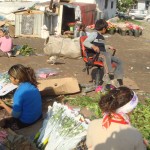 Photo 3: 2008. Roma houses were bought by investors at very low prices to construct appartment building complexes for a housing society of jurists, causing the former owners to live in ruins for two years deprived of electricity and city water. Some of them moved to their relatives homes, some of them went to other sections of the city and some set up tents under viaducts.
Photo 3: 2008. Roma houses were bought by investors at very low prices to construct appartment building complexes for a housing society of jurists, causing the former owners to live in ruins for two years deprived of electricity and city water. Some of them moved to their relatives homes, some of them went to other sections of the city and some set up tents under viaducts.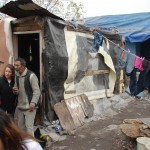 Photo 4: One of those who refused to sell their homes was Yuksel Dum and his family of 18 members. Yuksel Dum built a shed amidst the ruins of his demolished house and brought a legal action against the municipality. He sells flowers to earn a living for his family.
Photo 4: One of those who refused to sell their homes was Yuksel Dum and his family of 18 members. Yuksel Dum built a shed amidst the ruins of his demolished house and brought a legal action against the municipality. He sells flowers to earn a living for his family.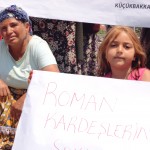 Photo 5: Although the legal action opened by Yuksel Dum is still under way Kadikoy Municipality sold his land to a businessman by way of tendering. Yuksel Dum opened another legal case against the sale.
Photo 5: Although the legal action opened by Yuksel Dum is still under way Kadikoy Municipality sold his land to a businessman by way of tendering. Yuksel Dum opened another legal case against the sale.Sheds built by 15 families living in the Roma neighbourhood of Kucukbakkalkoy who have nowhere to go were also demolished. One of these sheds belonged to Aydogan Dalkoparan who has a lung disease causing difficulty in breathing and walking. Dalkoparan and his family live in the street since 28th June 2011. Social democrat Ataşehir Municipality in charge of Kucukbakkalkoy provided no solution other than sending the family food three times a day with the exception of weekends. The land where once Aldogan’s house stood is now sold to an investor who will build there a luxury villa.
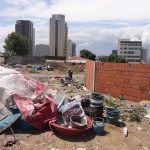 Photo 8- Ataşehir, the district of Istanbul where the Roma neighbourhood is located has become in recent years one of the most prestigeous places of the city. Very soon Istanbul Stock Exchange will move there, with the result that Ataşehir will become the finance centre of Istanbul. There will be no room for Yuksel Dum
Photo 8- Ataşehir, the district of Istanbul where the Roma neighbourhood is located has become in recent years one of the most prestigeous places of the city. Very soon Istanbul Stock Exchange will move there, with the result that Ataşehir will become the finance centre of Istanbul. There will be no room for Yuksel Dum -
Toronto Star: Help immigrants ship home cash
There is no paper trail. There is no public oversight. There are no clear rules. Yet the cash flow is staggering: roughly $200 billion a year.
That is how much immigrants and migrant workers send home though a makeshift network of traders and couriers. Canada’s share — approximately $7.5 billion a year — dwarfs the country’s foreign aid budget.
Although these untraceable remittances do a tremendous amount of good in poor countries, they also pose serious risks for both the sender and the state.
Immigrants have no guarantee their earnings will actually reach their families. The money could be pocketed by greedy middlemen, stolen in transit or whittled down by bribes to corrupt local officials.
Governments have no way of telling how much dirty money from drug dealers and terrorists is circulating in the system. It is certainly conducive to both.
But no one is stepping forward to regulate this trouble-prone business. More surprisingly, almost no one knows much about it. The statistics are all estimates. The academic studies are all based on fragmentary knowledge and conjecture.
A Toronto-based citizens’ group is working to change that. Acorn Canada, made up of up low- to moderate-income families, is conducting a multi-year campaign to make remittances safe and transparent.
It has taken on this ambitious task because its members — many of whom support families in Asia, Africa and Latin America — are tired of choosing between being gouged by the banks or swindled by greedy couriers.
Acorn just released an easy-to-read report outlining the extent of “hawala” (the colloquial term for the hand-to-hand system and the way it works).
A typical chain of transactions looks something like this: An immigrant or seasonal worker wants to send money to his family back home. His English is rudimentary. He is intimidated by big institutions, paperwork and costly service charges.
So he checks an ethnic newspaper and finds an advertisement for cheap money transfers to his homeland. He visits the establishment, usually a small export-import business, and arranges to send a small amount — say $100 — to his family. The owner charges a commission ranging from 25 cents to $1.25 and gives him an identification number that can be used to pick up the money.
The merchant then contacts one of his suppliers or agents in the immigrant’s home country and arranges to get the money to its destination. The two traders settle their debt by manipulating their balance sheets.
When the system works, it provides a cheap way to send money overseas. When it doesn’t, the immigrant is out-of-pocket and powerless.
There are safer ways to transfer funds, but they are extremely expensive. Acorn tracked the cost of sending a $100 remittance to Mexico, using recognized financial institutions, last fall. It found the fees could run as high as $50.
The cheapest option was MoneyGram, which charged between $3 and $10, depending on the speed and level of service. The highest priced was HSBC (Hong Kong and Shanghai Banking Corporation), which charged $50.84. The only Canadian bank willing to divulge its fees, Toronto-Dominion, fell in the middle at $35.91.
“These rates are predatory,” says Kay Bisnath, president of Acorn. They drive people to use the underground system. They force them to take unwanted risks.
This week, a delegation from Acorn met Deputy Finance Minister Michael Horgan hoping to convince him it would be in Canada’s interest to cap remittance rates and require banks to disclose their fees. It made the case that Ottawa needs to get a handle on this multi-billion-dollar business and immigrants need a safe, affordable way to send money home. The next step is up to the government.
It is unlikely that “hawala” will ever be eliminated. But in a 21st century financial system where money can be moved with the stroke of a computer key, immigrants deserve a better alternative.
-
Canada’s CBC Covers Remittance Justice Campaign
A new radio clip on the campaign to regulate remittances in Canada and around the world. To listen, follow the link below and scroll down to the story titled “Wire Transfer Fees” on June 20th.
http://www.cbc.ca/ottawamorning/episodes/
-

Save the Khimki Forest Action in Toronto
A delegation of five ACORN Canada members arrived mid-morning on Monday, April 25, 2011 to the very well appointed and fancy offices of Toronto subsidiary of Vinci Corporation of France.
A representative of Vinci came out to greet us, and ACORN leaders explained that we were there to demand that Vinci NOT accept the contract to build a highway through the Khimki Forest and cease being a part of the violence to organizers, community members, and the environment outside of Moscow.
To our members surprise and shock he refused to accept or fax our letter our letter of support, claiming that he cold not fax anything that the CEO wasn’t expecting. We believed this was a blatant lie, and it angered ACORN members even more and they renewed and repeated the demand that the letter be sent. Again he refused.
Our members held strong and asked for his name and a business card. He refused again. The whole thing was super shady and indicated an utter lack of transparency on their end. After a final attempt we left in frustration, shouting our demands as we returned to Toronto.
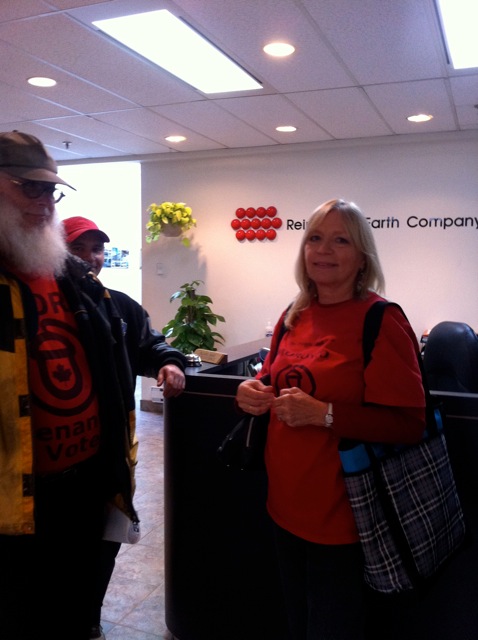
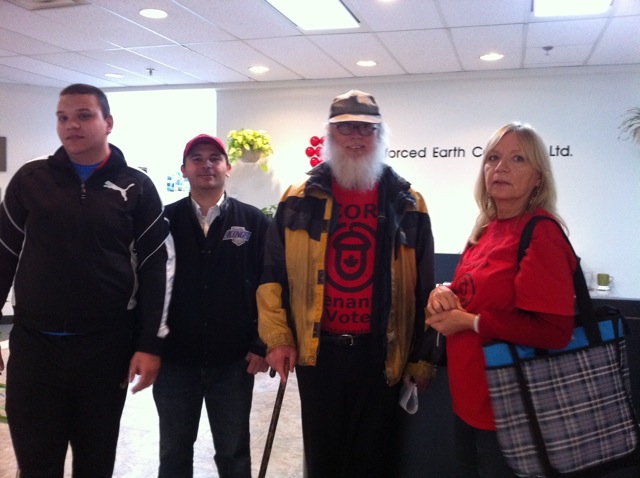
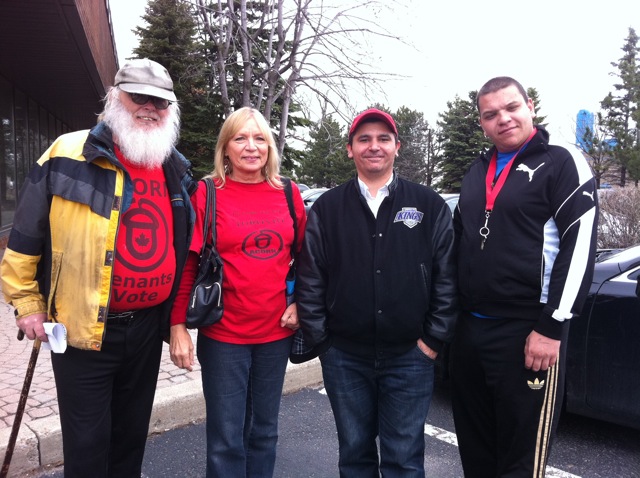
-
Press Release: ACORN International Calls on Russian Government to Protect Khimki Forest
On Monday ACORN International affiliates in Toronto, Buenos Aires, Prague, Tegucigalpa, and Mexico City along with other organizations acting around the world to demand along with community organizations and environmentalists in Moscow a halt to any efforts to build a highway through the protected Khimki Forest.
The Khimki Forests is one of the last protected woodlands anywhere near the vicinity of Moscow and proposals to build a wildly expensive highway through 15 kilometers of the Khimki has been a contentious debate between citizens and the Russian Federation government for years. After initially be green lit under President V. Putin, his successor President D. Medvedev, had ordered the project shelved for study given the huge opposition to the project in Moscow. The controversy has been marked by human rights violations including the police beating and crippling of a journalist opposing the project and the frequent harassment and arrest of community organizers and activists petitioning the government for caution and consultation on this project.
At the end of last year in a sudden reversal Medvedev, allowed the project to once again move forward. Vinci Construction, the global construction company, has been negotiating to undertake the project but has not yet signed a contract. The global action is intended to call attention to need to protect the Khimki Forest and to ask the Russian Government to re-examine the alternative routes for the highway that would continue to protect the environment and the community. ACORN is also calling on Vinci to walk away from the project in order to protect its own environmental, social, and human rights records which the company trumpets in its own annual report.
Actions in Toronto are focusing in Mississauga, where the corporate offices are located for Vinci in Ontario. Actions in Tegucigalpa, the capital of Honduras, are scheduled at the Russian Embassy where ACORN Honduras is asking that a message be sent to Moscow about the worldwide concern for these abuses. Actions by ACORN in Mexico City and Buenos Aires are also demanding that Vinci not sign the contract. Vinci has a controversial reputation already in the Czech Republic and ACORN-CC there is raising the issues that the same mistakes should not be made in Russia that have been made previously in the Czech Republic.

